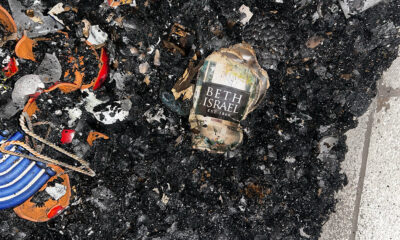RSS
Universities take action against pro-Israel faculty for inflammatory speech about Israel-Hamas war

(JTA) – A series of Jewish professors across the country have faced lawsuits, termination and suspension after making pro-Israel remarks that administrators say crossed the line into threatening speech.
Faculty members at New York University, the University of Southern California and Johns Hopkins University are among those who have been recently caught up in such controversies, as the campus climate around Israel continues to ferment in the weeks following the Oct. 7 Hamas attacks and Israel’s war against the terror group in the Gaza Strip.
“This current situation has really been time for me to put my money where my mouth is as a free-speech attorney,” Samantha Harris, an attorney representing one of the professors, told the Jewish Telegraphic Agency.
Cases of universities disciplining pro-Israel rhetoric since Oct. 7 have been relatively rare, as some of the most prominent campus controversies have involved the reverse. Some schools, under pressure from pro-Israel donors, politicians and legal aid groups, have taken a series of actions against pro-Palestinian students, faculty and events.
Leaders of Cornell University condemned a professor who praised the Hamas attacks as “exhilarating”; he later took a leave of absence. The University of Arizona recently suspended two professors who praised Hamas as a “resistance group” and questioned whether it is antisemitic, according to a recording posted by a pro-Israel social media account.
And the heads of the Massachusetts Institute of Technology, George Washington University, Columbia University and other schools have suspended pro-Palestinian student groups or disciplined students who participated in disruptive protests. The U.S. Department of Education’s civil rights office recently opened a series of investigations into universities over their handling of campus antisemitism cases, including some that took clear action against anti-Israel activities. The presidents of Harvard, MIT and the University of Pennsylvania are testifying before Congress next week as lawmakers seek to question whether they have responded forcefully enough to antisemitism.
But the cases of these three men — all at private colleges, and two of whom work in life sciences — show that strident pro-Israel and anti-Palestinian rhetoric has also occasionally been subject to consequences on campus. The offenses range from stray harsh words about Hamas to a professor tweeting multiple times that all Palestinians are “animals.”
An NYU director, fired over retweets, sues the hospital
The former director of NYU’s cancer research center is suing the hospital for firing him over a series of online posts he shared about Hamas and its supporters in the West.
Dr. Benjamin Neel was booted from that position earlier this month over his posting of political cartoons depicting Hamas calling for “death to all Jews,” and for caricatures showing Westerners, including climate activist Greta Thunberg, supporting the atrocities Hamas committed. He remains a tenured professor and the head of a laboratory at NYU, according to The New York Times. Neel’s attorney did not respond to questions sent via email.
NYU Langone Health fired Neel at the same time as it also fired another doctor for social media activity praising Hamas’ attack. Neel’s lawsuit, filed Nov. 16, claims that this made his own termination “a casualty” of the university’s “ill-considered plan to feign the appearance of even-handedness.”
In a statement to JTA, NYU maintained that it had proper standing to fire Neel from the cancer research center over what it said was a clear violation of the university’s code of conduct, social media policy and commitment “to providing a safe and inclusive environment, free of discrimination, for all of our employees and patients.”
“Dr. Ben Neel, as a leader at our institution, disregarded these standards in a series of public social media posts and later locked his Twitter/X account,” NYU spokesperson Steve Ritea said. “NYU Langone stands by our decision and looks forward to defending it in court.”
One of the arguments put forth by Neel’s attorneys is that his own pro-Israel speech pales in comparison to that of some of his more senior Jewish colleagues in private emails to him, who described other universities in insulting terms for failing to discipline anti-Israel speech. But NYU said Neel was acting “hypocritically” by including these emails in his lawsuit.
“Some of those emails were critical of specific decisions by university leaders for not taking a stronger stance on the Oct. 7 terrorist attacks and for not holding accountable those who engaged in discriminatory speech,” Ritea wrote. “Hypocritically, Dr. Neel is now lashing out for being held accountable for such conduct.”
At Johns Hopkins, a doctor is placed on leave over “disturbing” tweets
Another university hospital has also taken disciplinary measures against a Jewish program director and professor for his incendiary social media posts.
Johns Hopkins Medicine placed the director of its pediatric cardiac critical care program, Dr. Darren Klugman, on leave over a series of posts he wrote shortly after Oct. 7 that advocated violence against all Palestinians. Klugman is also a medical school professor.
Klugman’s posts on X, formerly known as Twitter, painted all Palestinians as “morally depraved” and “savage animals,” and called for them to be murdered or displaced. “Time to reclaim every inch of Israel for Jews,” he wrote on Oct. 8, according to screenshots published by the university’s newsletter and other outlets.
In one reply to a user who had suggested that Israel was calling for a “large-scale slaughter” and to “spread out massacres over a year to displace Palestinians,” Klugman wrote, “G-d willing.”
Klugman has since apologized for his posts, writing in a letter to colleagues, “These messages in no way reflect my beliefs, me as a person, a physician, a friend, or colleague.” His X account is no longer active.
Kim Hoppe, a spokesperson for Johns Hopkins Medicine, told JTA that Klugman will remain on leave while the university conducts “a thorough investigation” and called his posts “deeply disturbing.”
“Statements that explicitly threaten or extol violence against groups or individuals on the basis of national origin, race or religion violate our policies and do not represent our values,” Hoppe’s statement continued.
An online petition calling on Johns Hopkins to “remove” Klugman has garnered more than 8,000 signatures. In the Jewish conservative magazine Commentary last week, Washington Free Beacon writer Daniel Halper implored Johns Hopkins to “forgive Dr. Darren Klugman,” Klugman helped treat his daughter, who was born with congenital heart defects.
“His apology should be accepted,” Halper wrote. “As the father of a Klugman patient, I know he means it. Why? Because I witnessed with my own eyes how he delivered medical care.”
A USC professor is barred from campus over filmed anti-Hamas remarks
While Klugman was placed on leave over explicitly anti-Palestinian posts, a USC economics professor, John Strauss, was asked to stay off campus after students filmed him calling for the death of Hamas.
Strauss was also informed by USC’s provost that he is under investigation following several student complaints filed against him through the university’s Equal Employment Opportunity/Title IX office. Harris, his attorney, says it’s wrong for USC to be investigating him.
“I do not think the investigation is appropriate,” said Harris, a former attorney with the campus free-speech legal group Foundation for Individual Rights and Expression. “University administrations perform absolutely no gatekeeping function when it comes to student complaints. They simply are categorically unwilling to say to a student, ‘No, I’m sorry, we have policies that protect the right to free speech.’”
Harris wouldn’t comment on Strauss’ legal strategy.
Strauss was filmed telling students, “Hamas are murderers. That’s all they are. Every one should be killed, and I hope they all are killed.” He made his remarks at a campus pro-Palestinian protest.
Some students and pro-Palestinian groups later claimed online that Strauss had been referring to all Palestinians, rather than just Hamas, and that he had stepped on their memorials to Gazans killed by the Israeli military. But Strauss told the Los Angeles Times that he wasn’t referring to all Palestinians and did not step on the memorial deliberately.
“I am Jewish and very pro-Israel, so I shouted, ‘Israel forever. Hamas are murderers,’” he said.
Harris told JTA that Strauss’ speech should be protected: “Saying ‘I hope people die’ is not a threat.”
Strauss will still be permitted to teach students virtually through the current semester, which ends this week. A USC spokesperson told JTA that Strauss “has in no way been disciplined for engaging in protective speech,” describing his removal from campus as “a precautionary measure” that’s “designed to minimize disruption in the classroom and to ensure a safe environment for both him and students.”
Harris disputed USC’s characterization of its actions toward Strauss. “It clearly is being considered a disciplinary measure,” she said. She also pointed to what she said was a “perceived double standard” in which universities are more willing to discipline inflammatory pro-Israel speech than pro-Palestinian comments, pointing to recent USC protests in which students chanted, “There is only one solution: intifada, revolution.”
“As far as I know, the people who chanted that are not under investigation,” she said.
A petition demanding USC bring Strauss back to campus has more than 19,000 signatures, while a competing petition demanding he be fired has a little over 7,200.
—
The post Universities take action against pro-Israel faculty for inflammatory speech about Israel-Hamas war appeared first on Jewish Telegraphic Agency.
RSS
After False Dawns, Gazans Hope Trump Will Force End to Two-Year-Old War

Palestinians walk past a residential building destroyed in previous Israeli strikes, after Hamas agreed to release hostages and accept some other terms in a US plan to end the war, in Nuseirat, central Gaza Strip October 4, 2025. Photo: REUTERS/Mahmoud Issa
Exhausted Palestinians in Gaza clung to hopes on Saturday that US President Donald Trump would keep up pressure on Israel to end a two-year-old war that has killed tens of thousands and displaced the entire population of more than two million.
Hamas’ declaration that it was ready to hand over hostages and accept some terms of Trump’s plan to end the conflict while calling for more talks on several key issues was greeted with relief in the enclave, where most homes are now in ruins.
“It’s happy news, it saves those who are still alive,” said 32-year-old Saoud Qarneyta, reacting to Hamas’ response and Trump’s intervention. “This is enough. Houses have been damaged, everything has been damaged, what is left? Nothing.”
GAZAN RESIDENT HOPES ‘WE WILL BE DONE WITH WARS’
Ismail Zayda, 40, a father of three, displaced from a suburb in northern Gaza City where Israel launched a full-scale ground operation last month, said: “We want President Trump to keep pushing for an end to the war, if this chance is lost, it means that Gaza City will be destroyed by Israel and we might not survive.
“Enough, two years of bombardment, death and starvation. Enough,” he told Reuters on a social media chat.
“God willing this will be the last war. We will hopefully be done with the wars,” said 59-year-old Ali Ahmad, speaking in one of the tented camps where most Palestinians now live.
“We urge all sides not to backtrack. Every day of delay costs lives in Gaza, it is not just time wasted, lives get wasted too,” said Tamer Al-Burai, a Gaza City businessman displaced with members of his family in central Gaza Strip.
After two previous ceasefires — one near the start of the war and another earlier this year — lasted only a few weeks, he said; “I am very optimistic this time, maybe Trump’s seeking to be remembered as a man of peace, will bring us real peace this time.”
RESIDENT WORRIES THAT NETANYAHU WILL ‘SABOTAGE’ DEAL
Some voiced hopes of returning to their homes, but the Israeli military issued a fresh warning to Gazans on Saturday to stay out of Gaza City, describing it as a “dangerous combat zone.”
Gazans have faced previous false dawns during the past two years, when Trump and others declared at several points during on-off negotiations between Hamas, Israel and Arab and US mediators that a deal was close, only for war to rage on.
“Will it happen? Can we trust Trump? Maybe we trust Trump, but will Netanyahu abide this time? He has always sabotaged everything and continued the war. I hope he ends it now,” said Aya, 31, who was displaced with her family to Deir Al-Balah in the central Gaza Strip.
She added: “Maybe there is a chance the war ends at October 7, two years after it began.”
RSS
Mass Rally in Rome on Fourth Day of Italy’s Pro-Palestinian Protests

A Pro-Palestinian demonstrator waves a Palestinian flag during a national protest for Gaza in Rome, Italy, October 4, 2025. Photo: REUTERS/Claudia Greco
Large crowds assembled in central Rome on Saturday for the fourth straight day of protests in Italy since Israel intercepted an international flotilla trying to deliver aid to Gaza, and detained its activists.
People holding banners and Palestinian flags, chanting “Free Palestine” and other slogans, filed past the Colosseum, taking part in a march that organizers hoped would attract at least 1 million people.
“I’m here with a lot of other friends because I think it is important for us all to mobilize individually,” Francesco Galtieri, a 65-year-old musician from Rome, said. “If we don’t all mobilize, then nothing will change.”
Since Israel started blocking the flotilla late on Wednesday, protests have sprung up across Europe and in other parts of the world, but in Italy they have been a daily occurrence, in multiple cities.
On Friday, unions called a general strike in support of the flotilla, with demonstrations across the country that attracted more than 2 million, according to organizers. The interior ministry estimated attendance at around 400,000.
Italy’s right-wing government has been critical of the protests, with Prime Minister Giorgia Meloni suggesting that people would skip work for Gaza just as an excuse for a longer weekend break.
On Saturday, Meloni blamed protesters for insulting graffiti that appeared on a statue of the late Pope John Paul II outside Rome’s main train station, where Pro-Palestinian groups have been holding a protest picket.
“They say they are taking to the streets for peace, but then they insult the memory of a man who was a true defender and builder of peace. A shameful act committed by people blinded by ideology,” she said in a statement.
Israel launched its Gaza offensive after Hamas terrorists staged a cross border attack on October 7, 2023, killing some 1,200 people and taking 251 people hostage.
RSS
Hamas Says It Agrees to Release All Israeli Hostages Under Trump Gaza Plan

Smoke rises during an Israeli military operation in Gaza City, as seen from the central Gaza Strip, October 2, 2025. Photo: REUTERS/Dawoud Abu Alkas
Hamas said on Friday it had agreed to release all Israeli hostages, alive or dead, under the terms of US President Donald Trump’s Gaza proposal, and signaled readiness to immediately enter mediated negotiations to discuss the details.





